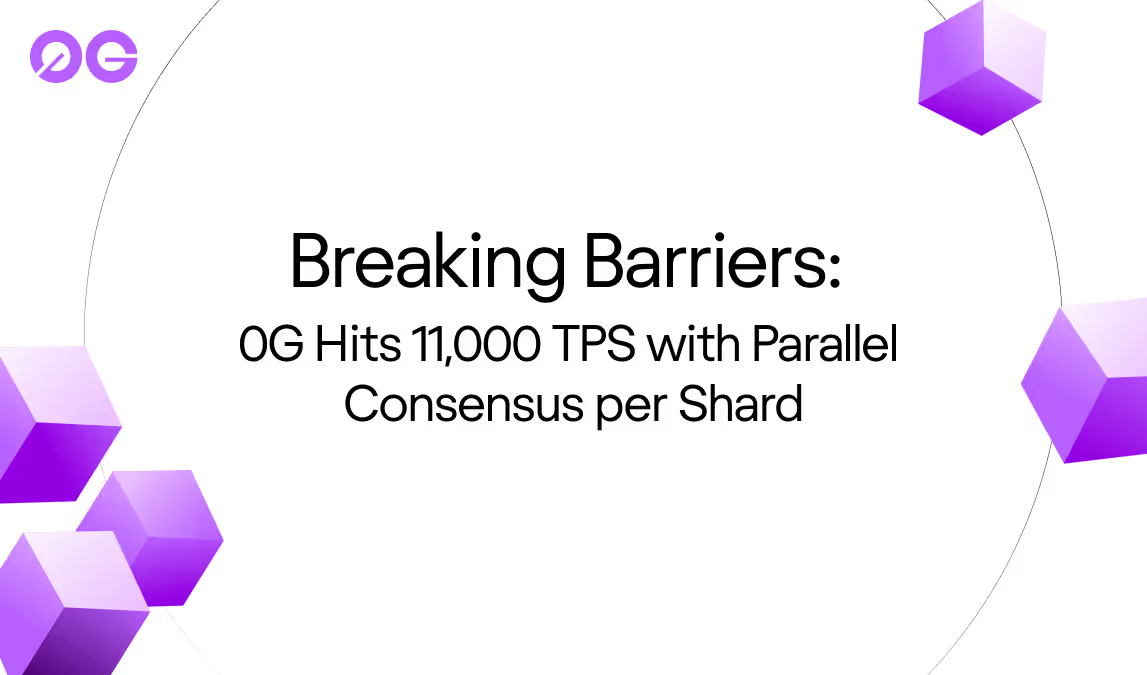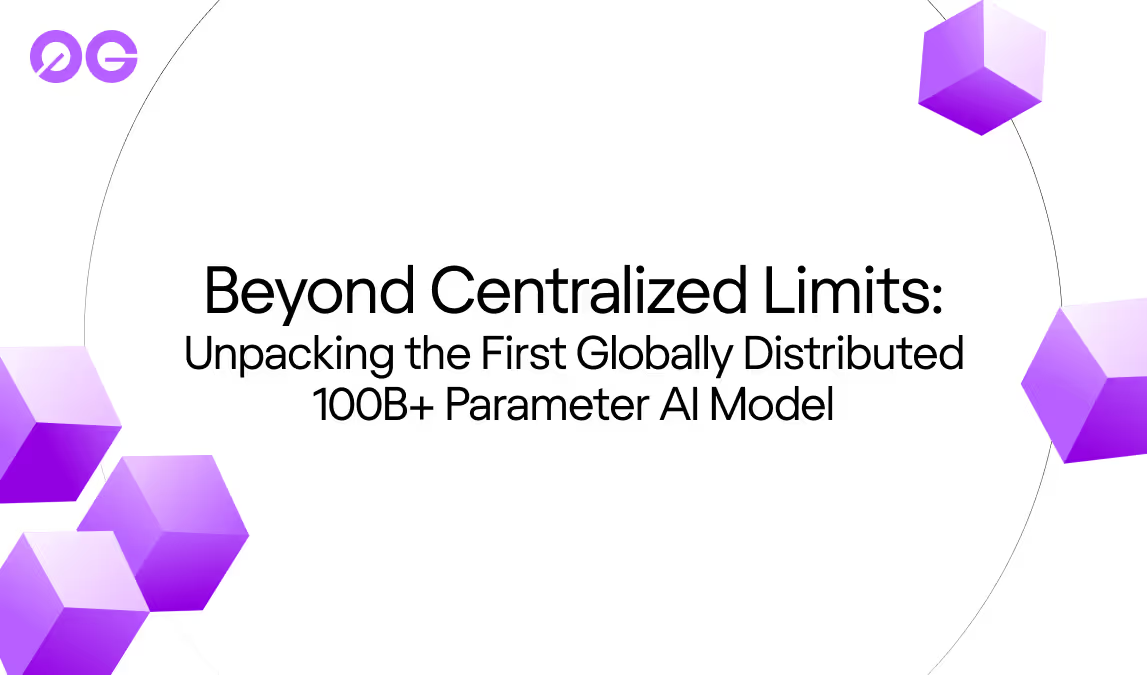

AI Evolution: How Intelligent Agents Will Learn, Adapt, and Compete in Web3
We’re living in a golden age of AI advancement. AI models are more powerful than ever and can produce high-quality outputs, adjusting their outputs based on new data. But most of today’s AI systems still exist within closed environments. They respond to prompts, but often in isolation. They learn, but not openly. And while they can improve over time, their evolution remains largely gated by centralized operators.
But AI is changing. As we shift toward more autonomous, agentic systems, AI agents won’t just answer questions or complete tasks. They’ll observe, learn from experience, and actively participate in open economies. This next phase of AI evolution will be powered by transparent systems, shared incentives, and onchain coordination. And it will happen on 0G, the first Artificial Intelligence Layer (AIL) built to support AI activity at scale.
From Closed-Loop AI Inferences to Open Feedback Loops
Many of today’s AI systems support fine-tuning and post-deployment learning. But those updates often happen in opaque ways, controlled by centralized teams and unavailable for user inspection or audit. The result is fragmented learning and limited continuity between how an agent performs in one environment and how it improves over time.
For AI agents to reach their full potential, learning must become a continuous, transparent loop, through processes developers and even regular users can observe, shape, and benefit from. This requires agents to retain performance history, incorporate real-world outcomes, and adapt based on experience across different contexts.
By recording behavioral outputs and user feedback onchain, learning can become a shared, verifiable process. 0G’s Compute Network lays the groundwork by enabling decentralized inference today, with a path toward decentralized training and fine-tuning via trusted execution environments (TEEs). These environments ensure agents can evolve safely, without compromising user privacy or exposing proprietary weights.
AI inference should not be the final step in an AI’s execution. When interactions and outcomes are recorded onchain, agents gain access to a wealth of open, tamper-proof behavioral data. In this sense, the next stage after inference should be a checkpoint in a continuous learning loop. And with data entirely onchain, learning becomes transparent, auditable, and user-aligned.
Adaptive Agents That Evolve Over Time
Learning enables intelligence. But adaptation is what allows intelligence to survive and thrive in a dynamic, multi-agent world. AI agents that can learn from data still fall short if they can’t retain and use that knowledge across contexts. Without persistent states such as memories of past behavior or evolving, individualized personality traits, agents are stuck in stateless cycles of reaction. They become indistinguishable, forgetful, and ultimately untrustworthy as autonomous participants in open ecosystems.
This is where 0G’s decentralized storage infrastructure comes in. Unlike static cloud storage, 0G Storage is designed to support real-time and archival AI state across applications. And because this data is stored verifiably and accessibly onchain, agents can build identity-aware memory stacks that are provably authentic and cross-compatible. Developers and users alike can inspect an agent’s “life history,” enabling more responsible AI and persistent behavioral customization.
This is more than just better UX. It’s a technical requirement for agents that can act over time, evolve ethically, and maintain long-term relationships with users, other agents, and onchain institutions. This ability to evolve behavior based on context and carry identity and history from one application to another is key to unlocking AI agents’ true competitive potential.
Interacting, Competing, and Powering New AI Economies
Today, agents mostly operate in isolation. You prompt them, and they respond. There’s no memory, no negotiation, and no interaction across agents—let alone cross-agent collaboration or competition. But in any complex system, intelligence doesn’t operate in a vacuum. It emerges through interaction. That’s what’s missing from today’s, and that’s exactly what 0G’s open, modular infrastructure is poised to enable.
0G is creating a dynamic onchain ecosystem in which AI agents can evolve in perpetuity, instead of running into passive endpoints. They become active economic participants capable of exchanging value, forming coalitions, challenging one another, and evolving through networked feedback. Within this backdrop, each market or challenge will become a new AI fitness function, shaping smarter agents over time.
Imagine an ecosystem with:
- AI research swarms that independently analyze a shared dataset, with some agents proposing insights or hypotheses while other agents verify, critique, or synthesize findings. Over time, this swarm could even act like a decentralized research institution that is self-improving and publicly auditable.
- Self-governing DAOs that collectively manage services like indexing, content moderation, or predictive modeling, with onchain governance deciding how resources are allocated, fees are split, and new members are admitted based on historical performance.
- Immersive entertainment worlds where agents control NPCs with persistent memory and economic incentives. Players can hire swarms of agents to manage virtual cities, defend against attacks, or stage coups as each agent learns from others, adapts to player strategies, and competes for storyline dominance in a living, breathing virtual world.
- Intellectual property agents that create, remix, and trade generative media assets—not as static NFTs, but as living iNFTs with verifiable provenance, automated royalty distributions, and adaptive behavior embedded across time and ownership.
These opportunities are not hypothetical: 0G's full-stack infrastructure supports every layer of this evolution. With onchain inference and training via the Compute Network, persistent memory and modular state through 0G Storage, and composable economic activity facilitated by ERC-7857 iNFTs and modular DA, 0G is the first network where agents can exist, evolve, and exchange value transparently and at scale.
0G is the Infrastructure for AI Evolution
AI agents today are the digital equivalent of single-celled organisms: reactive, transient, and isolated. They exist only in the moment, trained once and deployed blindly, with no memory of the past or anticipation of the future. But true intelligence is not static. It evolves, learning from experience, adapting to new challenges, and competing for relevance.
With the rise of web3, we finally have the open substrate to push agent evolution forward, from static scripts into adaptive, economic actors. And 0G is the operating system where this evolution will thrive. In this new model, agents won’t just generate content; they will generate value for the people who train, deploy, and collaborate with them. This is the only way to align AI design with human-centric goals and allow anyone to become co-creators of a new intelligent economy.
And it all starts here, with 0G.






